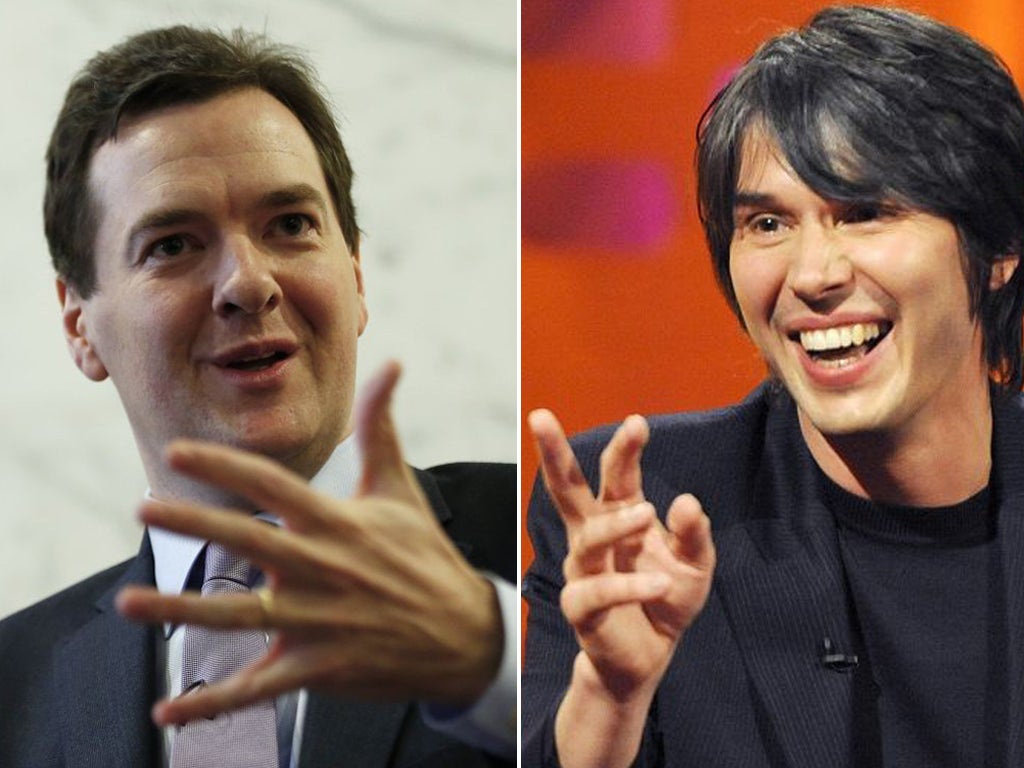You're on, Professor Brian Cox: George Osborne pledges to make Britain world leader in science

Your support helps us to tell the story
From reproductive rights to climate change to Big Tech, The Independent is on the ground when the story is developing. Whether it's investigating the financials of Elon Musk's pro-Trump PAC or producing our latest documentary, 'The A Word', which shines a light on the American women fighting for reproductive rights, we know how important it is to parse out the facts from the messaging.
At such a critical moment in US history, we need reporters on the ground. Your donation allows us to keep sending journalists to speak to both sides of the story.
The Independent is trusted by Americans across the entire political spectrum. And unlike many other quality news outlets, we choose not to lock Americans out of our reporting and analysis with paywalls. We believe quality journalism should be available to everyone, paid for by those who can afford it.
Your support makes all the difference.The Chancellor George Osborne said that he is up to the challenge of astronomer Brian Cox to make Britain the best place in the world to do science as he promised to make scientific innovation central to the country’s industrial strategy.
Making his first speech to the Royal Society, the UK’s national academy of sciences, Mr Osborne announced future Government support for eight areas of technology where Britain could lead the world.
One of the eight subjects, space and satellite technology, will receive an additional £60m a year – a total of £240m a year for the next five years – subject to negotiations with the European Space Agency, Mr Osborne announced.
Another area, synthetic biology which aims to design, engineer or replicate biological systems for industrial use, for instance by creating new forms of microbes that can eat industrial waste, will receive a research boost of £20m, he said.
However, the Chancellor refused to be drawn on whether he agrees with Professor Cox who has argued for a doubling of the £4.6bn science budget by using the money that the Government will raise from the auction of the 4G mobile phone spectrum to spend on scientific research.
“We don’t know how much we will get from the sale. It looks like the auction is on for next year, and we will then make the decision on how to spend the money,” Mr Osborne said.
The Campaign for Science and Engineering, which has organised a petition in support of reinvesting the 4G spectrum money in science, said that the Chancellor is saying the right things but this needs to be reflected in his future decisions.
“The forthcoming auction of the 4G spectrum will be a good test. That £4bn-ish revenues are a return on past investment in science and technology, and should be reinvested,” said Imran Khan, the director of the campaign.
In addition to Professor Cox, the 4G petition has been signed by the Astronomer Royal Martin Rees, a former president of the Royal Society, and Nobel scientist Professor Andrei Geim – both of whom were praised by Mr Osborne.
In his speech to the Royal Society, Mr Osborne said that he recognises the economic benefits of scientific excellence which is one of the reasons why the Government, with advice from the scientific community, has earmarked eight future technologies where the UK could be world-leading.
The list includes regenerative medicine, agricultural science, energy storage, advanced materials and robots. Britain already excels in all of these areas but with extra direction and support from Government, the country could outperform other countries, Mr Osborne said.
“It is not the government who creates the scientific innovation, or translates into growth. But we can back those who do. And as a government and as a scientific community we need to be willing to identify Britain’s strengths and reinforce them,” Mr Osborne said.
Sir Paul Nurse, the current President of the Royal Society and a Nobel Laureate, said that he was delighted that the Chancellor appeared to recognise the role of science in driving a dynamic economy.
“What is really important is that the Government and the Treasury are coming publicly to state that science is becoming more central to the Treasury’s thinking,” Sir Paul said.
Subscribe to Independent Premium to bookmark this article
Want to bookmark your favourite articles and stories to read or reference later? Start your Independent Premium subscription today.
Join our commenting forum
Join thought-provoking conversations, follow other Independent readers and see their replies
Comments